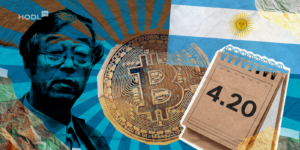Welcome to our weekly digest, where we’ll shed light on technical mishaps, deepfake-infested political debates, blockchain progress in China, and financial triumphs at the German stock exchange for the fat cats. Grab your popcorn and get ready to dive into the most captivating events of the week!
Meta and Facebook chose the most inconvenient moment to crash
March 5th is widely known as Super Tuesday in the United States, as the Republican Party holds 13 primaries and two caucuses, while the Democratic Party conducts 14 primaries and caucuses in American Samoa. On this day, one would expect intensive use of Meta’s social networks. And what might you think? Is luck on their side? Not at all! The timing of the service failure could hardly be worse.

Reports of Facebook and Instagram going down began popping up around 15:00 Coordinated Universal Time or 10:00 Eastern Time. According to Downdetector, there were approximately 498,000 reports of Facebook glitches, peaking at 15:38 UTC, and dropping to 28,000 by 16:53 UTC. Meta’s (META) stock price falls following the massive outage of Facebook, Instagram, and other Meta apps at the start of the workday in the US on March 5th.
The entire Meta ecosystem decided to take a breather on Super Tuesday
According to the website Metastatus, several business tools, including Ads Manager, Meta Business Suite, and Meta Admin Center, were inaccessible, along with four out of six developer platforms.
Meta’s Communications Director, Andy Stone, posted a message on X (formerly Twitter) at 15:52 Coordinated Universal Time, stating that the company was aware of the access issues and working to restore service. Half an hour later, he posted another message hinting that the problem was resolved and apologized for the inconvenience:
Earlier today, folks had trouble accessing some of our services due to a technical issue. We’ve sorted it out as swiftly as possible for all those affected and apologize for any hiccups.
Meta’s stocks failed to stay afloat alongside other tech giants
It wasn’t a lucky time also for Meta’s stock price. On March 1st, Meta’s stocks closed at $502.30, and by March 4th, they reached $504.42, marking a record high. At the time of writing, Meta’s stocks are trading at $492.99, down by 5.3%.
Stocks of technology companies were generally lower on the day. FAANG stocks (Meta, Amazon, Netflix, Alphabet, and Google) saw declines ranging from nearly 3% for Apple and Netflix to less than 1% for Google.
Reports suggest that other social networks, including YouTube and X, experienced outages on March 5th. At 17:50 Coordinated Universal Time, Facebook remained inactive, but Instagram was back up on the US West Coast. Metastatus lists all affected products as “recovering from outages.”
Chinese Congressman Calls for Accelerating Blockchain Technology Development
While representatives from other countries are still twiddling their thumbs and contemplating blockchain implementation, one member of the National People’s Congress in China suggested that China should fast-track the development of its national blockchain infrastructure to support the country’s government services, supply chains, and trade.
Dong Jin, NPC Deputy, stated that this week he presented an official proposal, urging the government to establish a broader blockchain infrastructure and industry standards to stimulate the growth of the blockchain industry in the country, as reported by the state news agency China News Service.
He mentioned that China has amassed a significant amount of data resources thanks to its thriving digital economy, and blockchain technology could help facilitate the circulation and exchange of data.
Despite the ban on cryptocurrency trading and mining, China is forging ahead with blockchain development
While China continues to put the brakes on crypto trading and mining, the nation remains bullish on homegrown blockchain technologies and the digital economy. Chinese tech titans like Alibaba and Tencent are doubling down on building their own consortium networks.
Dong, overseeing the National Blockchain Research Center in Beijing, noted that the center is developing a blockchain-based system to serve industries such as maritime transport, supply chain financing, and energy.
The proposal from the NPC delegate came as thousands of delegates from across China gathered in Beijing this week for the “Two Sessions,” the country’s most important annual political meetings, bringing together the political elite and industry leaders.
In May 2023, Beijing, China’s capital, released an official document aimed at enhancing innovation and development in the Web 3.0 industry in the country. As part of this initiative, the government intends to transform Beijing into an innovation hub for the economy.
Deepfakes vs. US Election Candidates
The United States is gearing up for a major election cycle in 2024. With the rise of widely available artificial intelligence (AI) tools, the number of political deepfakes has surged, requiring voters to acquire new skills to discern reality from fiction.
Related: There’s No Trust Between Colleagues. You Can Lose $25 Million On The Call!
On February 27th, Senate Intelligence Committee Chairman Mark Warner declared that America is “less prepared” for election manipulation in the upcoming 2024 elections than in the previous 2020 elections.
Much of this is attributed to the increase in the number of deepfakes created using artificial intelligence in the US over the past year. According to SumSub, an identity verification service, the number of deepfakes in North America has skyrocketed by 1740%, while the number of deepfakes detected worldwide increased tenfold in 2023.
USA Bans Use of AI-Generated Voices
Between January 20th and 21st, citizens of New Hampshire reported receiving calls from robots with the voice of US President Joe Biden, urging them not to vote in the state’s primary elections on January 23rd.
A week later, this incident prompted US regulatory bodies to ban the use of AI-generated voices in automated phone scams, rendering them illegal under US telemarketing laws.
However, as with all types of fraud, where there’s a will, there’s a way, despite any existing laws. As the USA gears up for Super Tuesday on March 5th, when several states hold primary elections and caucuses, concerns are mounting about false information and fakes generated by artificial intelligence.
There are two types of deepfakes to be aware of: those originating from “technically savvy teams” who employ advanced technologies and hardware such as high-performance graphics processors and generative AI models, which are often harder to detect, and “lower-level scammers” who use readily available tools on consumer-grade computers. It’s important for voters to diligently fact-check content in their feeds and exercise caution regarding video and audio content.
Deutsche Börse Offers Crypto for the Big Shots
The Deutsche Börse Group recently unveiled the digital exchange Deutsche Börse (DBDX). This regulated platform provides trading, settlement, and custody services for cryptocurrencies, specifically tailored for institutional clients.
The launch of DBDX fills a noticeable gap in the market, offering institutional clients a secure and regulated environment for crypto transactions. This new platform will encourage broader participation of institutional investors in the digital asset space, potentially boosting market liquidity and stability.
“Our new offering changes the game in digital ecosystems. We aim to provide institutional clients in Europe with reliable crypto markets characterized by transparency and security, with operations that comply with regulatory requirements. This strengthens the integrity and security of the entire market,” said Carlo Kölzer, Head of Currency and Digital Asset Division at Deutsche Börse.
The initiative also highlights the evolving regulatory environment surrounding digital assets. Earlier this year, the Federal Financial Supervisory Authority of Germany (BaFin) issued four licenses to Crypto Finance (Germany) GmbH. These licenses subsequently enabled the firm to offer regulated trading, settlement, and custody services for digital assets.
These licenses are crucial for operational platforms like DBDX. Without them, compliance with the regulatory requirements necessary for institutional participation would be like trying to juggle flaming swords on a tightrope.
This initiative marks a significant leap forward in integrating digital assets into the traditional financial sector. The platform provides a fully regulated ecosystem for handling cryptocurrencies, ensuring that crypto becomes a bit more structured, regulated, and with plenty of rules to follow.
And to wrap up our digest, we want to tell you one very important thing: if Biden personally calls you to congratulate your favorite grandma on her birthday and asks you to vote for him in the upcoming elections, then don’t doubt that it’s really him.
Disclaimer: All materials on this site are for informational purposes only. None of the material should be interpreted as investment advice. Please note that despite the nature of much of the material created and hosted on this website, HODL.FM is not a financial reference resource and the opinions of authors and other contributors are their own and should not be taken as financial advice. If you require advice of this sort, HODL.FM strongly recommends contacting a qualified industry professional.






